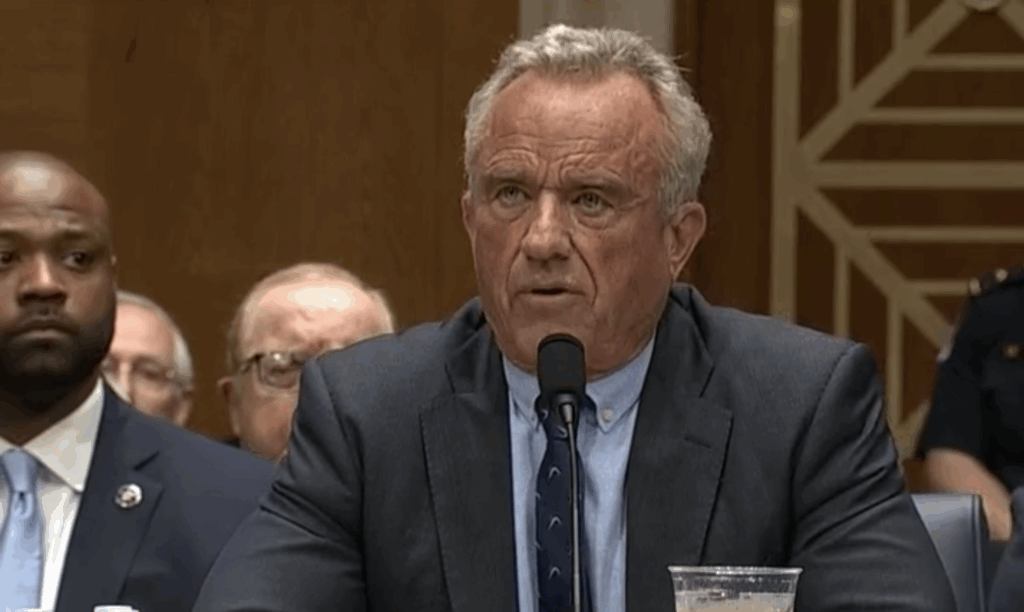 US Health Secretary Robert F Kennedy appearing before the Senate Health, Education, Labor and Pensions Committee in May.
US Health Secretary Robert F Kennedy appearing before the Senate Health, Education, Labor and Pensions Committee in May.While many public health experts have criticised United States Health Secretary Robert F Kennedy Jr for undermining vaccines, several think his focus on chronic illness and big food has potential – although they are sceptical of whether he will employ proven methods to improve citizens’ health.
Obesity, and associated problems of cardiovascular disease, diabetes and hypertension, have steadily increased over the past two decades in the US (with a brief dip in 2023), and the consumption of ultra-processed food (UPF) is a major driver of this.
“Nearly 70% of an American child’s calories today come from ultra-processed foods (67%), and over two-thirds of all calories consumed by American children are ultra-processed grains, sugars, and fats,” according to the recent Make America Health Again (MAHA) report.
Last week, Kennedy met lawmakers from Arkansas, Idaho and Utah when they announced that they would no longer allow low-income families who benefit the Supplemental Nutrition Assistance Program (SNAP) to use the food aid buy junk food and sugary drinks.
This is part of a drive by the US Department of Agriculture, which administers SNAP, and six states have adopted waivers qualifying what SNAP beneficiaries can buy. One-in-five US children were beneficiaries of SNAP in 2023, according to the MAHA report.
Kennedy’s Department of Health and Human Services announced last week that it aims to launch “a series of bold, edgy national campaigns” to make people aware of the links between ultra-processed food and diabetes and “challenge individuals to adopt disciplined, lifelong habits – centered on eating real food, physical fitness, and spiritual growth.”
Correct analysis – but no proven interventions
Global food policy expert Professor Barry Popkin told Health Policy Watch that the MAHA report “addressed ultra-processed food quite correctly and appropriately”.
“As for actions and next steps, they will come out in a month or two with a policy document, which will show us what Acts and laws they are addressing,” said Popkin, distinguished professor at the Gillings School of Global Public Health at the University of North Carolina (UNC).
Dr Tom Frieden, CEO of Resolve to Save Lives and a former director of the Centers for Disease Control and Prevention (CDC), agrees that the MAHA report “correctly identifies serious health threats from unhealthy foods, environmental toxins, and insufficient physical activity among children”.
Frieden also notes that the report’s “emphasis on reducing industry influence is important recognition of inappropriate commercial influence in health policy”.
But Frieden says that it “overlooks proven cost-effective interventions that reduce chronic diseases, including front-of-package warning labels, restrictions on marketing unhealthy products to children, taxes on sugar-sweetened beverages and tobacco, and comprehensive tobacco control measures.
 Since August 2021, Argentinian ultra-processed food companies have had to add warning labels to their products that are high in salt, sugar and other harmful ingredients.
Since August 2021, Argentinian ultra-processed food companies have had to add warning labels to their products that are high in salt, sugar and other harmful ingredients.“Countries implementing these policies have healthier kids, yet the report dismisses such regulatory approaches,” adds Frieden, whose organisation has extensive global experience in saving lives by addressing high blood pressure and unhealthy food.
“The report makes a compelling case for government intervention to address inappropriate corporate influences, then paradoxically rejects the regulatory solutions its own data supports.”
Frieden also criticises the report for failing to address tobacco use, the US’s leading preventable cause of death; advocating for voluntary industry agreements that have “repeatedly failed”, and not mentioning how primary healthcare can detect and manage chronic diseases.
MAHA: An opportunity and risk
Popkin and UNC colleague Dr Lindsey Smith Tallie describe the MAHA movement as “arguably the largest, most energised movement to date to address the USA’s twin epidemics of obesity and type 2 diabetes” in a recent article in The Lancet.
The growing focus on nutrition and NCDs is “long overdue” as poor diet has been a leading cause of death and disability in the US “for decades”, with 20% of children and 42% of adults living with obesity, they note.
“Over half of Americans consume sugary drinks on a daily basis, whereas approximately two-thirds of daily calories come from ultra-processed foods” but there has been “virtually no progression in policy to address poor diets”, they add.

But they acknowledge that while MAHA has “tremendous potential to transform the food system”, it also “carries serious risks unless policies are based on science”.
They point to Kennedy’s “record of denying or contradicting scientific evidence” and note that he may not be free of conflict-of-interests (he has close links with Big Wellness groups that stand to benefit from his policies).
They also warn that the Trump administration’s slashing of National Institute of Health funding will cripple biomedical research.
New York City letter
New York City, a global leader in anti-tobacco and other campaigns to address NCDs, has also weighed in on the MAHA report via a six-page letter to the MAHA Commissioner in May.
It urged the Food and Drug Administration to finalise sodium reduction targets and establish new added sugar reduction targets.
Michelle Morse, NYC’s Acting Health Commissioner, also offered the city’s expertise in promoting healthy food.
The city has paired its 1.5 million annual SNAP beneficiaries with farmers’ markets to offer incentives to both consumers and food producers. However, Morse warned that the Trump administration’s changes to SNAP “will make it harder for families to buy the foods they need to stay healthy. It is also critical thatthe federal government doesn’t place undue administrative burdens that may lessen the efficiency orincrease the cost of this effective and economy boosting program.”
“We encourage the administration to support evidence-backed policies, to lean on the expertise that exists within state and local health departments, and to consider the potential ramifications that budget cuts may have on the goal of reducing chronic disease,” the letter concludes.
Politicization of food policy?
Popkin and Smith question whether Kennedy and the Trump administration will be able to overcome massive opposition from the food industry to regulate the food environment.
They also stress that “transparent, rigorous, and conflict-free scientific processes are used, even if the outcomes do not align with the preferred policy positions”.
Otherwise, there is the risk of a greater politicization of food and nutrition policy to the detriment of everyone,” they warn.
Kevin Hall, one of the NIH’s most senior scientists studying nutrition, metabolism and neuroscience, announced his “early retirement” in April, saying that his research had been censored “because of agency concerns that it did not appear to fully support preconceived narratives of my agency’s leadership about ultra-processed food addiction”. His attempts to discuss his concerns with NIH leaders were ignored.
Meanwhile, Frieden warns: “Real progress demands systematic implementation of proven interventions, including through policies, regulations, and comprehensive programs like the CDC programs that Secretary Kennedy just dismantled.”
Image Credits: Thomas Kelley/ Unsplash, C-Span, Global Health Policy Incubator .
Combat the infodemic in health information and support health policy reporting from the global South. Our growing network of journalists in Africa, Asia, Geneva and New York connect the dots between regional realities and the big global debates, with evidence-based, open access news and analysis. To make a personal or organisational contribution click here on PayPal.








 English (US) ·
English (US) ·